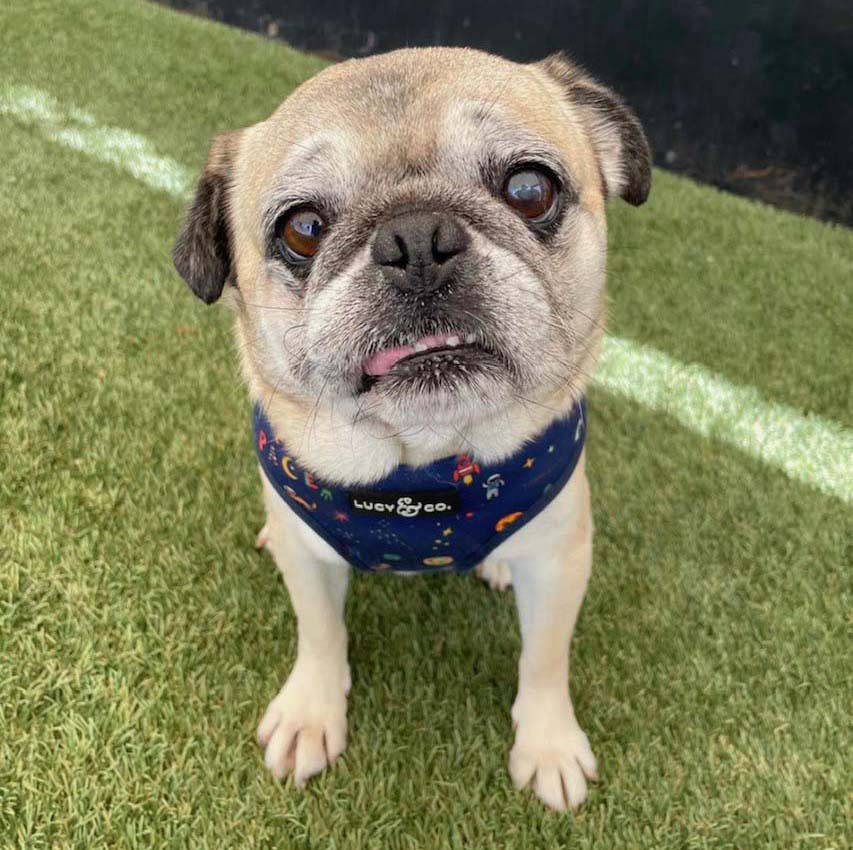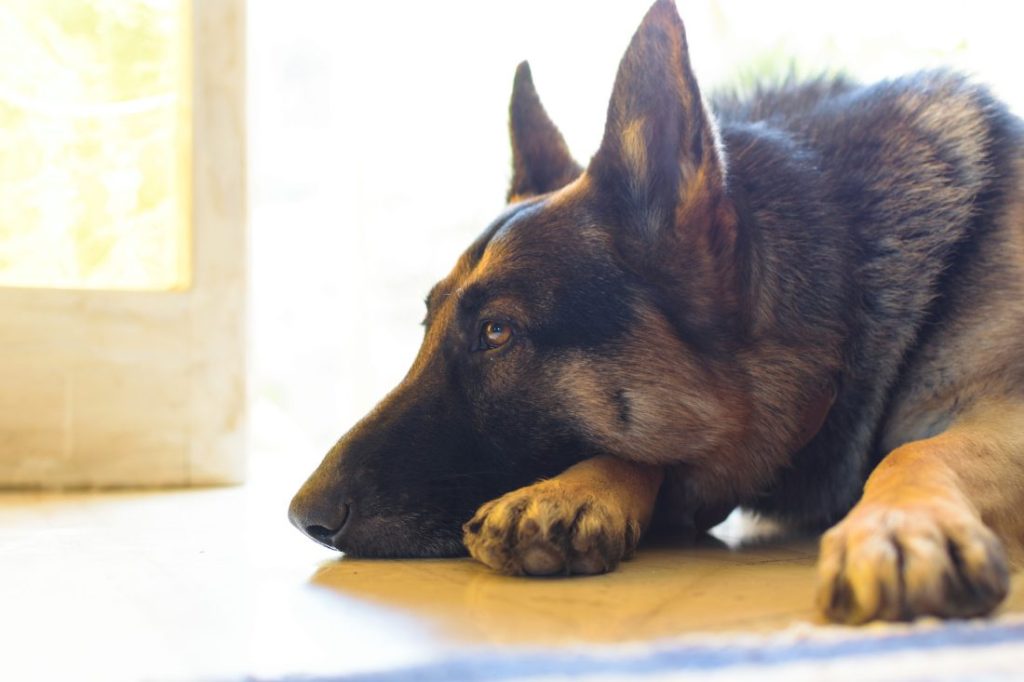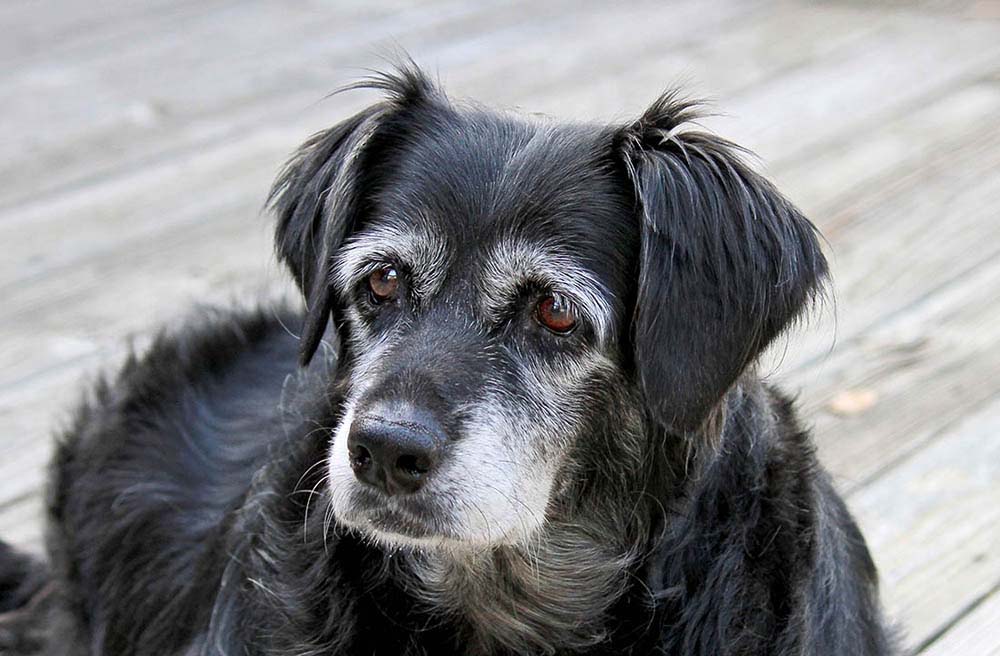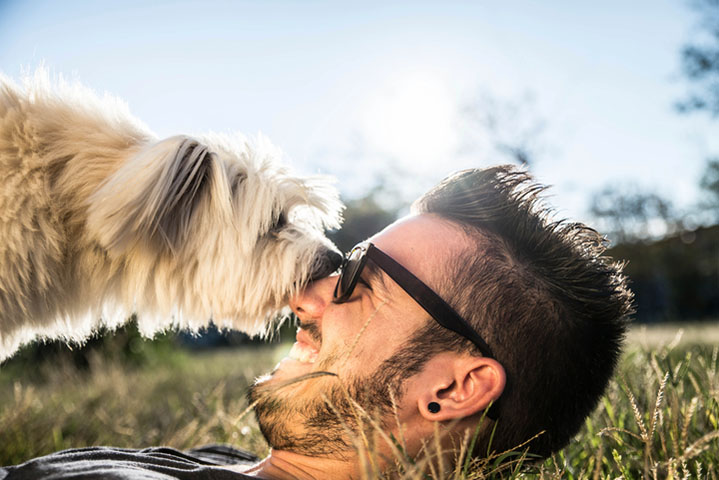Dementia in Dogs
Dog dementia is an unfortunate reality that can affect many older dogs, but it certainly doesn’t mean their life is over.
Dog dementia is an unfortunate reality that can affect many older dogs. But it certainly doesn’t mean their life is over. When pet owners have a good understanding of canine cognition, dogs with dementia can still lead happy, healthy lives. Here’s everything dog owners need to know about dementia in dogs.
What Is Dog Dementia?

Dog dementia, sometimes called canine cognitive dysfunction (CCD) or cognitive dysfunction syndrome (CDS), is a brain condition that affects older dogs. In general it causes a decline in cognitive function and related abilities.
While dementia is most common in senior dogs over eight years old, it can affect dogs as young as six. Their chance of developing dementia increases as they age.
The 3 Stages of Dog Dementia

Similar to Alzheimer’s disease in humans, dementia in dogs is progressive. It’s usually categorized into one of three stages that pet parents can recognize.
Stage One: Mild
Mild dog dementia involves early signs of your dog’s brain aging. This may look like acting groggy during the day or being confused during transition times. You may notice them becoming restless when it’s time for bed, or an increase in separation anxiety when you have to leave.
Stage Two: Moderate
Moderate dog dementia typically starts around one year after the initial mild signs of dementia. Symptoms include:
- a noticeable decrease in energy
- losing interest in activities
- sporadic toileting behavior like house soiling or going where they shouldn’t.
Stage Three: Severe
Severe dog dementia causes more drastic changes in your dog’s behavior and abilities. At this stage dementia in dogs significantly disrupts their sleep and impacts their sense of direction and navigation abilities.
Dogs with severe dementia may become more timid or anxious around family members they knew well before or in familiar places.
What Causes Dementia in Dogs?
The official cause of canine cognitive decline or dog dementia isn’t fully known. Scientists think that it’s likely related to a build-up of a protein called beta-amyloid in the brain. It’s thought that this protein build-up comes from trauma to the brain, diseases that can affect the brain, and chemical changes in the brain that result from aging.
What Are The Symptoms of Dog Dementia?

Dog dementia symptoms may vary depending on:
- your dog’s age
- which stage of dementia they’re in
- your dog’s breed
- environmental factors
While some of these symptoms are typical age-related behavior for dogs, in combination these signs may indicate an impact on their brain function.
Signs of Dog Dementia
According to dog behaviorists, the most common symptoms of canine dementia include things like:
- disorientation
- changes in behavior
- change in sleep patterns
- increase in anxiety
- changes in bathroom habits
Disorientation & Behavior Changes
A general sense of being disoriented is one of the most common signs of cognitive decline in dogs. This can present with behavior changes related to toileting, interacting with family members, or strange behavior in familiar settings.
Increased anxiety, likely a result of confusion, is one of the most common signs of dementia in dogs.
Changes in Sleep
Dementia in dogs impacts their sleep-wake cycle and their ability to get good rest, which can contribute to fatigue and grogginess.
Dogs experiencing cognitive decline may become confused when it comes to time for bed. They may present as wide awake while struggling to wake up in the morning or move through a normal day’s routine.
Bathroom Accidents
A common sign of increased cognitive decline is a pup who’s fully potty trained regressing in housetraining. They might start showing signs of anxiety around going to the bathroom, or confusion about how to signal their need to go.
Dogs with dementia may have more accidents in the house. They might start going in strange places, like on rugs or in potted plants.
How Is Dog Dementia Diagnosed?
Recognizing the symptoms of dog dementia is important for pet owners, but a veterinarian exam will confirm or deny your concerns. Your vet will likely perform both a physical exam to rule out other possible pet health issues, and a cognitive assessment to figure out what’s ailing your pup.
One such assessment is the DISHAA questionnaire, which stands for and measures Disorientation, Interaction, Sleep/wake cycles, House soiling, Activity, and Anxiety.
Treatments for Dog Dementia
Unfortunately for dogs and dog owners, treatment options for dementia are somewhat limited. There is no ‘cure’ for dementia in dogs. There are, however, ways that you can help your dog manage symptoms of dementia and continue to enjoy many aspects of life (and hopefully increase their life expectancy).
How To Manage Your Dog’s Dementia

Though a true cure for dog dementia hasn’t been discovered (yet), these strategies for managing your dog’s cognitive decline can greatly improve their experience.
Mental Stimulation
The brain is a muscle, so remember to use it or lose it! This is especially important for a dog’s quality of life if their activity levels drop due to dementia.
Keeping your dog’s brain stimulated with brain games and other mental activities can help slow cognitive decline. Enrichment activities like these help keep your dog mentally sharp and entertained.
Maintain Routines
While most dogs (and humans) thrive off of solid routines anyway, dogs with dementia especially need predictability and clear expectations. Maintaining a routine with your dog as they reach the senior years may help reduce instances of confusion, disorientation, or anxiety that can happen more easily in dogs with dementia.
Environment Adjustments
Making small adjustments to your dog’s environment (like limiting areas of the house they can access or adding nightlights to darker rooms) may also help reduce symptoms of overwhelm or confusion from dog dementia.
With fewer areas to navigate, your dog can become familiar and comfortable with the space they do have access to. Closing doors, using baby gates, or utilizing a dog playpen are great ways to reduce the space an old dog has to roam in.
This content is for informational use only and does not replace professional nutrition and/or medical advice, diagnosis, or treatment. It is not a substitute for and should not be relied upon for specific nutrition and/or medical recommendations. Please talk with your veterinarian about any questions or concerns.
Citations
“Senior Dog Dementia.” 2022. Cornell University College of Veterinary Medicine. October 3, 2022. https://www.vet.cornell.edu/departments-centers-and-institutes/riney-canine-health-center/canine-health-information/senior-dog-dementia.
“Cognitive Dysfunction Syndrome | Cornell University College of Veterinary Medicine.” n.d. Www.vet.cornell.edu. https://www.vet.cornell.edu/departments-centers-and-institutes/riney-canine-health-center/canine-health-information/cognitive-dysfunction-syndrome.








